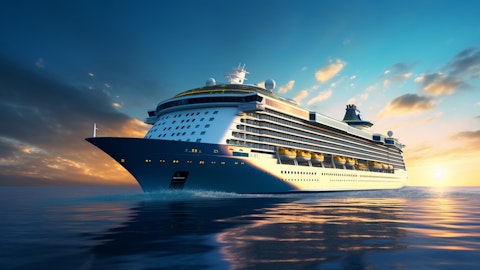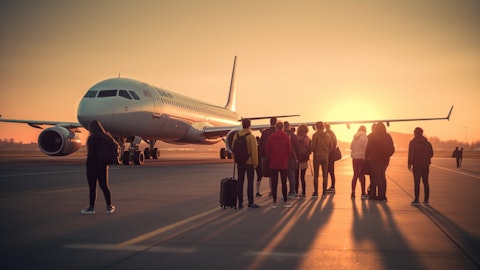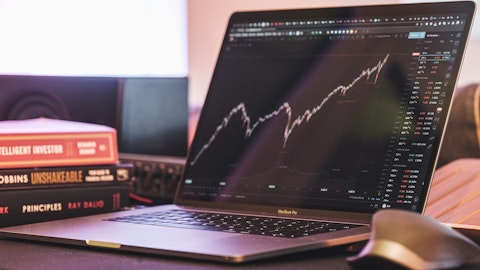Ben Chaiken: That’s a great point. Thanks.
Operator: Your next question comes from the line of Matthew Boss with JPMorgan. Please go ahead.
Matthew Boss: Great, thanks. And congrats on another nice quarter. So Jason, coming off strongest wave season in history, could you elaborate on the continued near-term strength cited in April, both from demand and pricing, maybe, if anything, by region? And to your comments earlier, how best to think about your market share opportunity in this 1.9 trillion growing global vacation market? And then just for Naftali, just as we think about the underlying guidance rate, where are you more confident today as we think about the back half, maybe relative to three months ago?
Jason Liberty: Sure. Well, thanks for the question, Matt. First off, I think just — I mean wave was absolutely exceptional. It’s kind of mid-teens better than what we saw on the previous year. Interesting enough, though, April was almost double that in terms of the level of demand that we were seeing. So that’s why when I talk about demand is accelerating, it’s not just what we saw when we last spoke to everybody in early February. It’s not just when we updated at the end of February. But that acceleration has picked up speed. And of course, at this point, we only have about 12% load factors left to build for the year. And so that will provide opportunity for us to a degree this year. But what that I think means in terms of the opportunity into 2025 and beyond is very appealing.
I think when you frame that the $1.9 trillion of travel space, and of course, that’s a growing number, cruises $65 billion of that $1.9 trillion. So we’re a very, very small fraction. And I think something we’ve talked about before is a 1% shift is worth 11 Oasis-class ships to us. And so for us, when you look at things like Perfect Day, when you look at things like the Royal Beach Club, when you look at things like Utopia, you look at things like what we’re doing on Edge and Nova, it’s very purposeful, less about what’s happening with other cruise operators. It’s more, how do we take further share? How do we compete with Orlando? How do we compete with Las Vegas? How do we compete with other land-based alternatives to grab that share, where as we know today, currently trades at least at a 25% or 30% premium to what we’re getting.
So that value, we want to close that gap to land-based vacation, and we want to take share. And we believe by waking up and being just obsessed at delivering the best vacation experiences in the world puts us in a position to win.
Naftali Holtz: Hey, Matt. It’s Naf. Just to add one other thing to Jason. Also, if you kind of look at 19 versus where we are today, we have been taking share. Again, you don’t have to believe much. And as Jason said, 1% is 11 Oasis-class ships. That’s a pretty significant rise. But we’ve continued to focus on it and make progress there. I think just in terms of the strength, as you kind of heard in our prepared remarks, the strength is across all our key itineraries. And, of course, the Caribbean continues to be performing very well. But as much as others, Alaska, Europe, and obviously we’re coming back to China. So we feel pretty good of where we are standing today. When our book position, where the pricing is for the rest of the year.
Operator: Your next question comes from the line of Sharon Zackfia with William Blair. Please go ahead.
Sharon Zackfia: I think on the last call, you had talked about 80% of passengers being North American this year. I’m just wondering if there’s any update on that, if there’s any change. And then as we think about next year, kind of where would you expect, North America to go? It’s kind of been unusually large the last few years. And if we see kind of China or Europe ramp up in the passenger base, how do we think about that impact on onboard revenue?
Jason Liberty: Yes. Well, thanks for the question, Sharon. I hope you’re doing well. So I think just starting off, we need to just frame that, we have global brands, not nationalistic brands. And these global brands are supported by a very significant commercial apparatus, with leading yield management tools and teams around the world. And so the sourcing is really a reflection of the demand patterns that we see to optimize our ultimate revenue. More China next year, as we add that second ship into China, can move this number a little bit to be less North American centric. But we’re going to follow the demand patterns. And that is how we’ve done it for a very, very long period of time. And of course, that could potentially shift the mix of onboard and ticket.
I don’t think it’s going to materially shift it because I do think that we’ll probably be relatively close to the sourcing that we saw this year. Maybe it moves a little bit, but it’s not going to move a lot. But we’re focused on optimizing our revenue. And so if we’re getting more in ticket from a customer and a little bit less on onboard, we’re perfectly okay with that. As long as the answer is higher yield profile and higher margin profile for us. And that’s how we’ve run the business for a very long time. And I think we’re very fortunate to have thought long time ago to make sure that our brands are positioned to be globally desirable in sourcing from many different markets.
Sharon Zackfia: Jason, can I ask a follow up? The one or two passengers being millennials at this point, do you find that that customer is more inclined to pre-book onboard versus kind of their elders like me? Or, is it, are you seeing pre-booking success kind of across the demographic gamut?
Jason Liberty: Yes. I mean, it skews a little bit younger, but I think, Sharon, one, if we can pick any, positiveness out of COVID, was that the consumer, a young or middle-aged, et cetera, got very used to booking or buying things online. We also really improved our ability to take friction out of the booking experience for a ticket price, as well as the booking experience for onboard, by curating, taking a lot of steps out of the process, et cetera. And that’s really what is driving that better behavior. The installation of a proper commerce system that we can yield manage, that we can curate, which we’re still very in the early innings on, is really what’s benefiting that. And you just think about just shopping behavior. In the first quarter, we had 100 million visits to our websites, 100 million.
That’s twice what we had pre-COVID. And so, we have really upped our game, not just on a marketing basis, but also to make that our websites helped our customers dream about what they want to do and help them get to the experience that they’re looking for. And then making sure that they have all the onboard experiences that they want to have and being able to resolve all that well in advance of them getting on the ship.
Operator: Your next question comes from the line of Brandt Montour with Barclays. Please go ahead.
Brandt Montour: So maybe for Michael, China restarted this month. Wondering if you could give us maybe even qualitatively a sense of sort of initial load factors, initial pricing or initial expected onboard spend. Obviously, you can’t give us that specifically, but just sort of better or worse than you were forecasting. And clearly, the follow up is, you decided to take Ovation there next year. That’s obviously a good sign. But why Ovation? I think that comes out of Alaska and Australia. Why that ship? And why not a ship necessarily out of the Caribbean or somewhere else? Thank you.
Michael Bailey: Brandt, yes, good question. I think, the fact that we’ve already deployed a second ship into the China market gives you an indication of how well the first ship is doing in the China market. So we’re pleased with the spectrum bookings. Our comparison, of course, is back in 2019, which we’ve used a lot over the last couple of years. Overall volume and rate for the China product in ’24 is significantly higher in both volume and rate from ’19, which is a great indicator of the kind of demand that we’re seeing for the product. And we feel good about ’24 going into ’25. That’s why we’ve got the second ship. Both quantum class, both have done very well in the China market. They seem to be really well suited for that market.
And of course, Ovation, both in Alaska and Australia, is perfectly suited for the China market in terms of its geographical positioning. One will be in Tianjin, which we’ve operated out of many years before the pandemic. And of course, Shanghai, both great markets for us. The onboard spend, obviously, it’s only the couple of days into the season, but it’s looking really positive. We have high expectations and I think they’re going to be realized. The other thing that’s changed quite a lot in terms of the market dynamics in China is the change in our direct business versus the traditional trade business. There was quite a transformation during the pandemic in terms of a lot of the retailers that dropped out of business. Fortunately, pre-pandemic, we started to invest significantly in resources, technology, people to develop that direct business.
And we continued through the pandemic and we accelerated when we came out of the pandemic. And it’s proving to be very productive for us. So overall, our distribution strategy is proving to be successful. Demand seems very, very strong. Of course, Korea opened up, which is great. So that gives us a better itinerary product to offer to our guests. And we’re feeling good about how this will play out. Of course, we’ve been in China for a decade before. So we’ve all been through the ups and downs, but currently it’s looking pretty positive.




